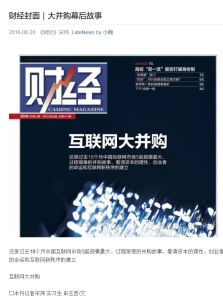
A Behind-the-Scenes Look at the Five Biggest Internet Mergers of 2015 and 2016
Recommendation
Merger announcements dominated the tech news in 2015–2016. Internet top dogs that had been at each other’s necks suddenly became one. Some of these corporate weddings had been predictable, like the merging of ride-sharing companies Didi, Kuaidi and Uber China: The companies had burned through their cash so quickly that a merger seemed to be the only way out. Other deals were shocking even to company employees. Workers at the group-buying companies Meituan and Dianping were surprised when they learned that a former rival would become part of their company. Employees of the online travel agencies Ctrip and Qunar were similarly startled. Caijing Magazine reporter Song Yang and his team reveal the intriguing stories behind these deals and explore their effects on China’s Internet industry as a whole. getAbstract recommends this article to business managers, investment bankers, start-up CEOs and anyone up for a good story of business intrigue.
Summary
About the Authors
Song Wei is a leading reporter for Caijing Magazine, an independent publication that covers societal, political and economic issues. This article was a collaborative effort with contributions from Caijing intern Shen Yuzhe and reporters Gao Honghao, Zhang Jun, and Liu Yiming.








Comment on this summary